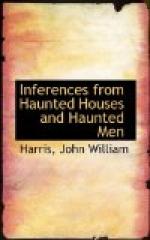[Footnote 6: A. Lang’s “Ghost Stories.”]
These victims of hypnotists were thus four—two very eminent literary men, distinguished also in other ways; a very rising naval officer; and a diplomatist, a member of the foremost of the services of the Crown.
Father B. was attacked in 1888-89 in London. In June 1892, Father H. visited the Haunted House at B——. He first brought the haunting to the notice of Lord Bute in August 1892, and in 1893 met a lady who had been governess at B—— about twelve years before, and who reported that the house was haunted then.
A noise like the continual explosion of petards, another like the falling of a large animal against his bedroom door, another noise like spirit raps, and shrieks were heard by Father H.; no one else then heard them. Father H. heard them for eight nights, and not on the ninth. As a priest, he was probably a good deal alone, and had to walk over to a cottage behind a belt of wood to the eastward, where the retreat of the nuns he attended to was held.
According to the average experience of Miss Freer’s party, he would only have been attacked on about two days. The last day his tormentor left—doubtless to avoid a journey with Father H. and subsequent recognition. How these sounds are produced is easily understood. If the doctrine of a very light stream of electricity be admitted, the pressure on the ear readily causes raps—there is a slight buzzing sound if the pressure on the ear be relaxed at a distance at first, later there is pain; the flap is from an intermitted pressure. It is a thud if the pressure be more acute, and the pattering, which is almost identical to the effect produced by a drop of water rolling on the inside of a sensitive ear, occurs when there is a double or treble intermission. In some cases where the victim is strong, the consonants can be worked off to his hearing.
Add to this a slight effect on the eye, and Miss Campbell’s doubtfully pronounced word “candle” becomes clear enough. An initial starts a word there is some reason to believe. Mr. Osgood Mason dwells upon community of sensation, and it is doubtless this that renders the direction of aim so exact; but when the subject of tickled faces is considered, we shall see that it does not insure complete accuracy, any more than that exists in volley firing, which with inferior shots is more telling than independent firing, and yet is not perfect.
The reason why more audile phenomena are perceived at night is that the percipient is tolerably still. Father H. and other people heard these sounds more when in bed after daylight. If loud clangs, &c., were heard by night by the garrison under Miss Freer’s command, it was that the attacking hypnotists did not have the chances they had with Father H. of hypnotising their victims; and here again, where action on the ear and eye is concerned, talking with a friend, or indeed any one, is a great safeguard. The tympanum




